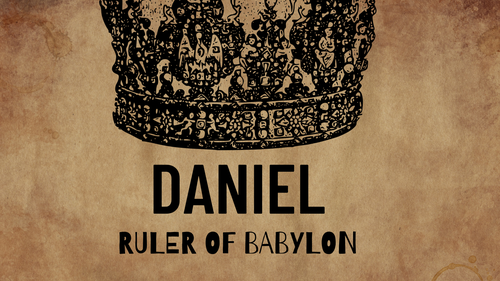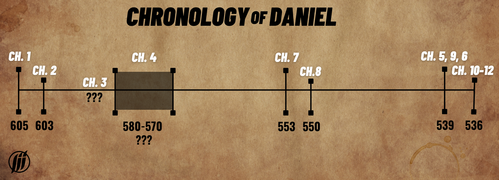Daniel, Ruler of Babylon
The chapters of Daniel famously jump back and forth through time. What insights emerge when we put them in chronological order?

Daniel in Order
Here's what Daniel looks like when we put the chapters in order:
- Daniel 1 - "The third year of Jehoiakim king of Judah" (approx. 605 BC)
- Daniel 2 - "The second year of Nebuchadnezzar" (approx. 603 BC, give or take a year)
- Daniel 3 - Unknown
- Daniel 4 - Unknown (approx. 570-560 BC)
- (This chapter tells us that Nebuchadnezzar lost his sanity for 7 years. Given that Nebuchadnezzar died in 562, this chapter should likely be placed in 570 or earlier. This is further corroborated by what we know of Nebuchadnezzar's reign: his constant wars ended around 585 BC, leading to a relatively tranquil period of building - a setting of this story)
- Daniel 7 - "The first year of Belshazzar" (approx. 553 BC)
- Daniel 8 - "The third year of Belshazzar" (approx. 550 BC)
- Daniel 5 - Fall of Babylon (539 BC)
- Daniel 9 - "The first year of Darius son of Xerxes - a Mede" (approx. 539 BC)
- Daniel 6 - Clearly the beginning of Darius' rule of Babylon (approx. 539 BC)
- Daniel 10 - "The third year of Cyrus king of Persia" (approx. 536 BC)
- This is complicated because Cyrus began reigning as king of Persia in 559 BC. So does Daniel 10 take place around 556 BC? No. Clearly Daniel means the third year of Cyrus after Babylon had been conquered, because in 11:1 (ch. 10-12 is a continuous unit) Darius the Mede is mentioned. It seems that Darius either died or was removed and Daniel began reckoning time by the reign of Cyrus instead of Darius.
- Daniel 11 - (approx. 536 BC)
- Daniel 12 - (approx. 536 BC)
That's a lot of bullet points. Sometimes it can help when we visualize it:

When we want to analyze the biblical material, we must first gather the data and then organize it - such as by creating a timeline. When we organize it, patterns can emerge.
The first thing we recognize is that stories of Daniel take place in three distinct clusters: The Nebuchadnezzar Stories (Chapters 1-4 - 605-562), the Early Belshazzar Stories (chapters 7-8 - 553-550) and the Late Belshazzar/Persian Stories (chapters 5, 6, 9-12 - 539-536). It can be said that all of the Book of Daniel really covers three distinct parts of his life. And they truly are distinct: In the Nebuchadnezzar Stories, we find Daniel refusing to eat King Nebuchadnezzar's food (1:8). But in the Persian Stories we find Daniel setting aside the "choice food" as well as meat and wine (10:3). This means that Daniel had begun eating the "choice food" at some point after chapter 1. While we don't know exactly why Daniel refused Nebuchadnezzar's food (offered to idols? Making a political statement? Unclean?), we can surmise that if Daniel resumed eating the food in the Persian period, he was doing so as the ruler of Babylon and could likely prepare the food in a way that was acceptable to him. Understanding the chronology helps us see solutions to this problem.
The first thing we recognize is that stories of Daniel take place in three distinct clusters: The Nebuchadnezzar Stories (Chapters 1-4 - 605-562), the Early Belshazzar Stories (chapters 7-8 - 553-550) and the Late Belshazzar/Persian Stories (chapters 5, 6, 9-12 - 539-536). It can be said that all of the Book of Daniel really covers three distinct parts of his life. And they truly are distinct: In the Nebuchadnezzar Stories, we find Daniel refusing to eat King Nebuchadnezzar's food (1:8). But in the Persian Stories we find Daniel setting aside the "choice food" as well as meat and wine (10:3). This means that Daniel had begun eating the "choice food" at some point after chapter 1. While we don't know exactly why Daniel refused Nebuchadnezzar's food (offered to idols? Making a political statement? Unclean?), we can surmise that if Daniel resumed eating the food in the Persian period, he was doing so as the ruler of Babylon and could likely prepare the food in a way that was acceptable to him. Understanding the chronology helps us see solutions to this problem.
Comparing Daniel 6 + 9 (539 BC)
We often compare chapters that are next to us because chapters are, usually, in order. When they are not in order we have to put them in the chronological order to understand context. When we do that we find Daniel 6 and 9 connected as they both took place within a few months of each other.
Daniel 6 features a law which is passed to prevent Daniel from praying to his God in hopes of killing him. This chapter takes place just before the events of chapter 9, which is mostly a long prayer in which Daniel wrestles with the ending of the exile and his hopeful return to Jerusalem. While Daniel 6 emphasizes that praying three times a day was Daniel's habit, the close historical context of his prayer in Daniel 9 helps us understand what he was praying for in this days: a return home. The fact that the satraps refer to Daniel as "one of the exiles from Judah" precisely at the moment where Daniel was looking for the end of his exile might suggest that the satraps knew of Daniel's desire to return home and were wickedly "twisting the knife" by reminding others of his status as a exile.
We also see a nice contrast between the lion's den which attests to Daniel's innocence before the king in ch. 6 and Daniel's prayer in ch. 9 where he confesses that "we have been wicked and have rebelled." Daniel was innocent as an individual as pertaining to Persian law, but he saw himself as a member of a guilty people before the law of God.
Now, why do I say Daniel 6 takes place before chapter 9? Because Daniel identifies himself in 9:1 as one who was "made ruler over the Babylonian kingdom." This is exactly what Darius intended to do in 6:3 and it seems after the lion's den ordeal he made good on this intention by promoting Daniel over the kingdom of Babylon.
We could also note that in chapter 5 -- which also takes place in 539 BC -- we have Belshazzar promising to make Daniel third highest in the Babylonian kingdom (after Nabonidus and Belshazzar). Daniel rejects this offer and ends up becoming, within a few months, a ruler of Babylon himself (9:1). Daniel rejected Belshazzar's offer of power because he had faith in God that Babylon was doomed. As a result, he gained greater power than he would have had.
See what cool stuff we can learn?
Daniel 6 features a law which is passed to prevent Daniel from praying to his God in hopes of killing him. This chapter takes place just before the events of chapter 9, which is mostly a long prayer in which Daniel wrestles with the ending of the exile and his hopeful return to Jerusalem. While Daniel 6 emphasizes that praying three times a day was Daniel's habit, the close historical context of his prayer in Daniel 9 helps us understand what he was praying for in this days: a return home. The fact that the satraps refer to Daniel as "one of the exiles from Judah" precisely at the moment where Daniel was looking for the end of his exile might suggest that the satraps knew of Daniel's desire to return home and were wickedly "twisting the knife" by reminding others of his status as a exile.
We also see a nice contrast between the lion's den which attests to Daniel's innocence before the king in ch. 6 and Daniel's prayer in ch. 9 where he confesses that "we have been wicked and have rebelled." Daniel was innocent as an individual as pertaining to Persian law, but he saw himself as a member of a guilty people before the law of God.
Now, why do I say Daniel 6 takes place before chapter 9? Because Daniel identifies himself in 9:1 as one who was "made ruler over the Babylonian kingdom." This is exactly what Darius intended to do in 6:3 and it seems after the lion's den ordeal he made good on this intention by promoting Daniel over the kingdom of Babylon.
We could also note that in chapter 5 -- which also takes place in 539 BC -- we have Belshazzar promising to make Daniel third highest in the Babylonian kingdom (after Nabonidus and Belshazzar). Daniel rejects this offer and ends up becoming, within a few months, a ruler of Babylon himself (9:1). Daniel rejected Belshazzar's offer of power because he had faith in God that Babylon was doomed. As a result, he gained greater power than he would have had.
See what cool stuff we can learn?
What about food?
A chronology can give insight into other problems as well. Linguistically, Daniel 2:3 (603 BC) to 7:28 (553 BC) were written in Aramaic whereas the rest of the book (ch. 1 and 8-12) was written in Hebrew. While there's no way to know why the book was written in two languages like this for sure (why start in 2:3? Why end in chapter 7?) , a chronology might give us a hint: Aramaic was the lingua franca of Babylon and when the events of Daniel 2 took place Daniel was a recent graduate of Babylon University where he would have been taught to use Aramaic (1:4). Daniel could likely understand Aramaic before arriving in Babylon, but his recent graduation and employment in Nebuchadnezzar's court might explain why he began writing in Aramaic.
Why then did Daniel stop writing in Aramaic after chapter 7 (553 BC)? This is harder to understand. It's possible that Daniel reverted back to Hebrew as the power of Babylon began to crumble. Perhaps the change of language had to do with the content of chapters 8-12 in that Daniel wanted to hide them from Belshazzar?
We will likely never know, but finding new ways to approach these questions sure is interesting.
Why then did Daniel stop writing in Aramaic after chapter 7 (553 BC)? This is harder to understand. It's possible that Daniel reverted back to Hebrew as the power of Babylon began to crumble. Perhaps the change of language had to do with the content of chapters 8-12 in that Daniel wanted to hide them from Belshazzar?
We will likely never know, but finding new ways to approach these questions sure is interesting.
Recent
Archive
2023
2022
June

No Comments